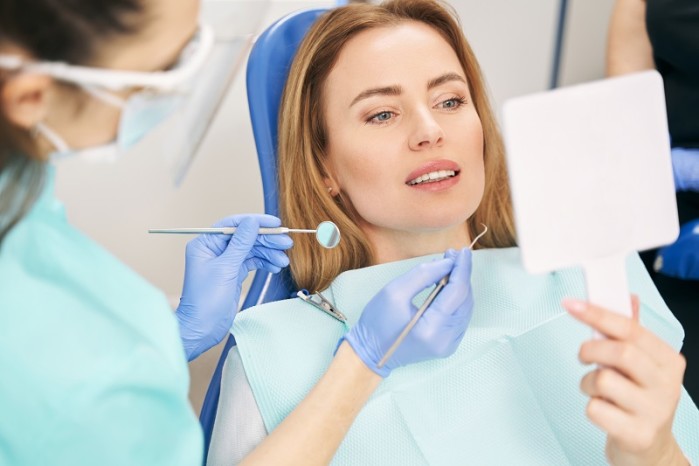Dental health

Proper oral hygiene is essential for healthy and beautiful teeth. To keep your teeth healthy, daily dental care, regular visits to the dentist for prophylaxis and a healthy diet are all necessary. Only through proper oral hygiene can you avoid unpleasant and painful consequences such as tooth decay, tartar and periodontal disease.
Why is dental health so important?
Good oral hygiene affects the health of the entire body. If harmful bacteria are not removed from the oral flora, they will enter the bloodstream and promote disease.
If the oral flora are not properly cared for, the bacteria will collect on your teeth in the form of plaque . This plaque can be removed if you brush your teeth and clean the spaces between your teeth. However, if your oral hygiene is inadequate, the plaque will become stuck and tartar will develop. You can then have this removed yourself. The tartar is removed from the gum line and interdental spaces using suitable instruments during a professional teeth cleaning.The teeth are also polished, which makes it difficult for new bacteria to adhere, and a fluoride treatment is carried out to protect the teeth from decay.
What can result from a broken tooth?
Individual diseased teeth can negatively affect the entire body. If diseases such as tooth decay or periodontal disease are not treated immediately, there is a risk that the bacteria will spread throughout the entire body. In the worst case, this will result in, for example, cardiovascular diseases, respiratory diseases or diabetes being promoted.
Prevent and relieve toothache
Toothache can be triggered by a variety of causes. However, good oral hygiene can prevent pain. It is important that you use the right toothbrush and toothpaste, and that you not only clean the surfaces of the teeth, but also the spaces between your teeth. Also pay attention to your diet: a lot of fibre and food that is not too acidic or sugary is the name of the game.
If you have a toothache, we always advise you to visit a dentist. Self-treatment should only serve as a first aid measure. Because how the pain is treated depends entirely on the cause of the pain.
Prevent and treat periodontal disease
Periodontitis is often the result of inflammation of the gums, which is caused by an accumulation of bacterial plaque. The bacteria attack the gums and the jawbone, so that the tooth no longer has a secure hold and, in the worst case, falls out. The most common causes of periodontal disease are either inadequate oral hygiene or genetic conditions. In order to be able to recognise and treat periodontitis at an early stage, you should make regular prophylactic preventive appointments at the dentist.
Bleeding gums
If your gums are bleeding, this is often a sign of inflammation of the gums (gingivitis). The cause of bleeding gums is bacteria that collect and harden in the oral cavity. If the surfaces of the teeth and the interdental spaces are not sufficiently cleaned, the plaque will solidify and tartar will form. Although brushing irritated gums is uncomfortable, it is the only way to stop bleeding gums.
Dental health and nutrition
Proper oral hygiene is not the only key to promoting dental hygiene – diet also plays an important role. Foods that contain acid and sugar should be avoided as far as possible, whereas foods that contain fibre have a particularly positive effect on teeth. Raw food and whole grain products should be chewed for a long time, which promotes self-cleaning and produces saliva. Saliva can neutralise acids and replace the minerals lost from the tooth enamel. Milk and dairy products contain calcium, which is responsible for building and maintaining teeth.
Teeth during pregnancy
Intensive oral hygiene is particularly important during pregnancy. This is because the hormonal changes during pregnancy also have an impact on the gums. They are supplied with more blood and are therefore softer. Bacteria can attach more easily, which can lead to bleeding gums and inflammation.
Pregnancy can also lead to an increased risk of tooth decay. Changed eating habits, especially sugary foods, contribute to caries bacteria accumulating and multiplying.
Tooth enamel can also be severely attacked during pregnancy. Since many pregnant women suffer from nausea and vomiting, the stomach acid gets onto the teeth. It is therefore advisable to rinse your mouth with mouthwash.
Dental health in children
To save children the painful experience of tooth decay, they should get used to brushing their teeth as early as possible and should be taught how to enjoy it. Baby teeth should be looked after just as well as permanent teeth. If a baby tooth is affected by decay, the disease is passed on directly to the second, permanent tooth. In order to protect and strengthen the milk teeth, dentists recommend using a soft toothbrush and toothpaste that contains fluoride.
Headaches and teeth
Toothache and dysfunction of the masticatory organ can definitely cause headaches. In order to find out whether headaches or migraines are caused by your teeth or an impairment of your masticatory organ, you should visit a dentist and have a functional analysis carried out. Therapeutic measures can then be derived based on this analysis.
Regular visits to the dentist
Good dental health requires regular checkups at a dentist. Diseases of the teeth and the oral cavity are detected at an early stage and can be treated in good time. In addition, when you visit the dentist, you will be given valuable tips regarding your oral hygiene and will be made aware of areas you should pay even more attention to when brushing your teeth.